Top Rankings
Mansfield Township School District ranks among the top 20% of public school district in New Jersey for:
Category
Attribute
Overall Rank
Highest overall rank (Top 20%)
Math Proficiency
Highest math proficiency (Top 20%)
Reading/Language Arts Proficiency
Highest reading/language arts proficiency (Top 20%)
Science Proficiency
Highest science proficiency (Top 20%)
For the 2025 school year, there are 2 public schools serving 549 students in Mansfield Township School District. This district's average testing ranking is 9/10, which is in the top 20% of public schools in New Jersey.
Public Schools in Mansfield Township School District have an average math proficiency score of 57% (versus the New Jersey public school average of 36%), and reading proficiency score of 69% (versus the 49% statewide average).
Minority enrollment is 35% of the student body (majority Black and Asian), which is less than the New Jersey public school average of 62% (majority Hispanic).
Overview
This School District
This State (NJ)
# Schools
2 Schools
2,573 Schools
# Students
549 Students
1,360,617 Students
# Teachers
56 Teachers
116,573 Teachers
Student : Teacher Ratio
10:1
10:1
District Rank
Mansfield Township School District, which is ranked within the top 20% of all 646 school districts in New Jersey (based off of combined math and reading proficiency testing data) for the 2021-2022 school year.
Overall District Rank
#113 out of 650 school districts
(Top 20%)
(Top 20%)
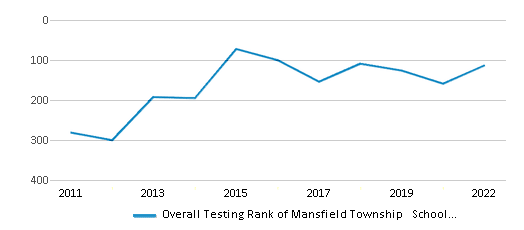
Math Test Scores (% Proficient)
57%
36%
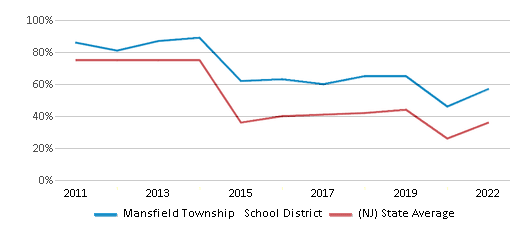
Reading/Language Arts Test Scores (% Proficient)
69%
49%
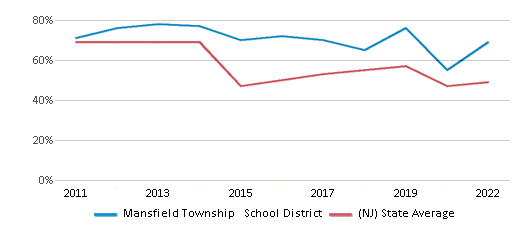
Science Test Scores (% Proficient)
40-44%
23%
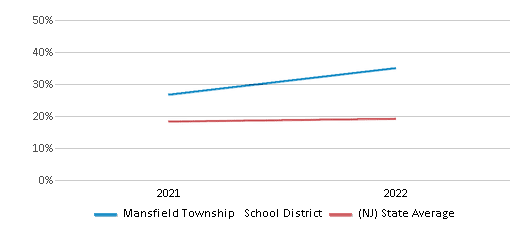
Students by Ethnicity:
Diversity Score
0.55
0.72
# American Indian Students
1 Student
2,837 Students
% American Indian Students
n/a
n/a
# Asian Students
50 Students
141,451 Students
% Asian Students
9%
10%
# Hispanic Students
49 Students
458,869 Students
% Hispanic Students
9%
34%
# Black Students
57 Students
195,970 Students
% Black Students
11%
15%
# White Students
357 Students
515,021 Students
% White Students
65%
38%
# Hawaiian Students
1 Student
2,719 Students
% Hawaiian Students
n/a
n/a
# Two or more races Students
34 Students
42,985 Students
% of Two or more races Students
6%
3%
Students by Grade:
# Students in PK Grade:
31
61,597
# Students in K Grade:
87
91,086
# Students in 1st Grade:
61
93,943
# Students in 2nd Grade:
79
96,713
# Students in 3rd Grade:
76
95,865
# Students in 4th Grade:
77
97,373
# Students in 5th Grade:
66
98,202
# Students in 6th Grade:
72
99,575
# Students in 7th Grade:
-
100,830
# Students in 8th Grade:
-
101,895
# Students in 9th Grade:
-
107,031
# Students in 10th Grade:
-
106,285
# Students in 11th Grade:
-
106,937
# Students in 12th Grade:
-
103,061
# Ungraded Students:
-
224
District Revenue and Spending
The revenue/student of $28,670 is higher than the state median of $26,931. The school district revenue/student has declined by 9% over four school years.
The school district's spending/student of $24,627 is less than the state median of $25,828. The school district spending/student has declined by 9% over four school years.
Total Revenue
$16 MM
$36,642 MM
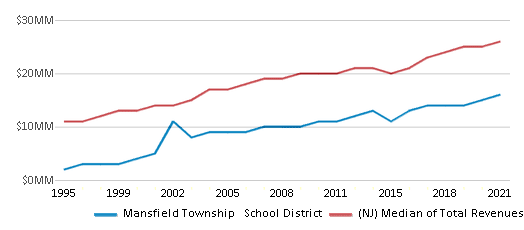
Spending
$14 MM
$35,142 MM
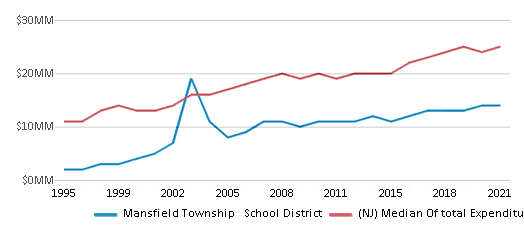
Revenue / Student
$28,670
$26,931
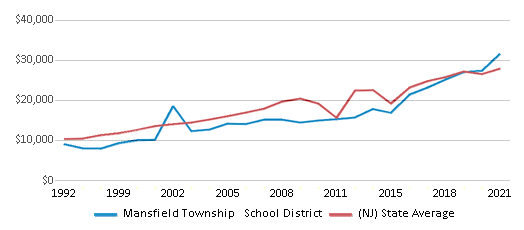
Spending / Student
$24,627
$25,828
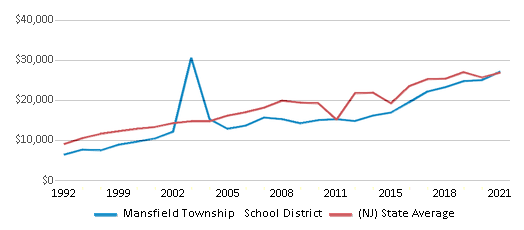
Best Mansfield Township School District Public Schools (2025)
School
(Math and Reading Proficiency)
(Math and Reading Proficiency)
Location
Grades
Students
Rank: #11.
Mansfield Township Elementary School
(Math: 57% | Reading: 69%)
Rank:
Rank:
9/
Top 20%10
200 Mansfield Road East
Columbus, NJ 08022
(609) 298-2037
Columbus, NJ 08022
(609) 298-2037
Grades: 3-6
| 291 students
Rank: n/an/a
19 Locust Ave
Columbus, NJ 08022
(609) 298-0308
Columbus, NJ 08022
(609) 298-0308
Grades: PK-2
| 258 students
Frequently Asked Questions
How many schools belong to Mansfield Township School District?
Mansfield Township School District manages 2 public schools serving 549 students.
What is the rank of Mansfield Township School District?
Mansfield Township School District is ranked #113 out of 646 school districts in New Jersey (top 20%) based off of combined math and reading proficiency testing data for the 2021-2022 school year. This district ranks in the top 20% of New Jersey school districts for: Highest overall rank (Top 20%), Highest math proficiency (Top 20%), Highest reading/language arts proficiency (Top 20%) and Highest science proficiency (Top 20%)
What is the racial composition of students in Mansfield Township School District?
65% of Mansfield Township School District students are White, 11% of students are Black, 9% of students are Asian, 9% of students are Hispanic, and 6% of students are Two or more races.
What is the student/teacher ratio of Mansfield Township School District?
Mansfield Township School District has a student/teacher ratio of 10:1, which is lower than the New Jersey state average of 12:1.
What is Mansfield Township School District's spending/student ratio?
The school district's spending/student of $24,627 is less than the state median of $25,828. The school district spending/student has declined by 9% over four school years.
Recent Articles

What Is A Charter School?
Explore the world of charter schools in this comprehensive guide. Learn about their history, how they operate, and the pros and cons of this educational innovation. Discover key facts about charter schools, including admission policies, demographics, and funding, as well as what to look for when considering a charter school for your child.

10 Reasons Why High School Sports Benefit Students
Discover the 10 compelling reasons why high school sports are beneficial for students. This comprehensive article explores how athletics enhance academic performance, foster personal growth, and develop crucial life skills. From improved fitness and time management to leadership development and community representation, learn why participating in high school sports can be a game-changer for students' overall success and well-being.

February 05, 2025
Understanding the U.S. Department of Education: Structure, Impact, and EvolutionWe explore how the Department of Education shapes American education, from its cabinet-level leadership to its impact on millions of students, written for general audiences seeking clarity on this vital institution.





